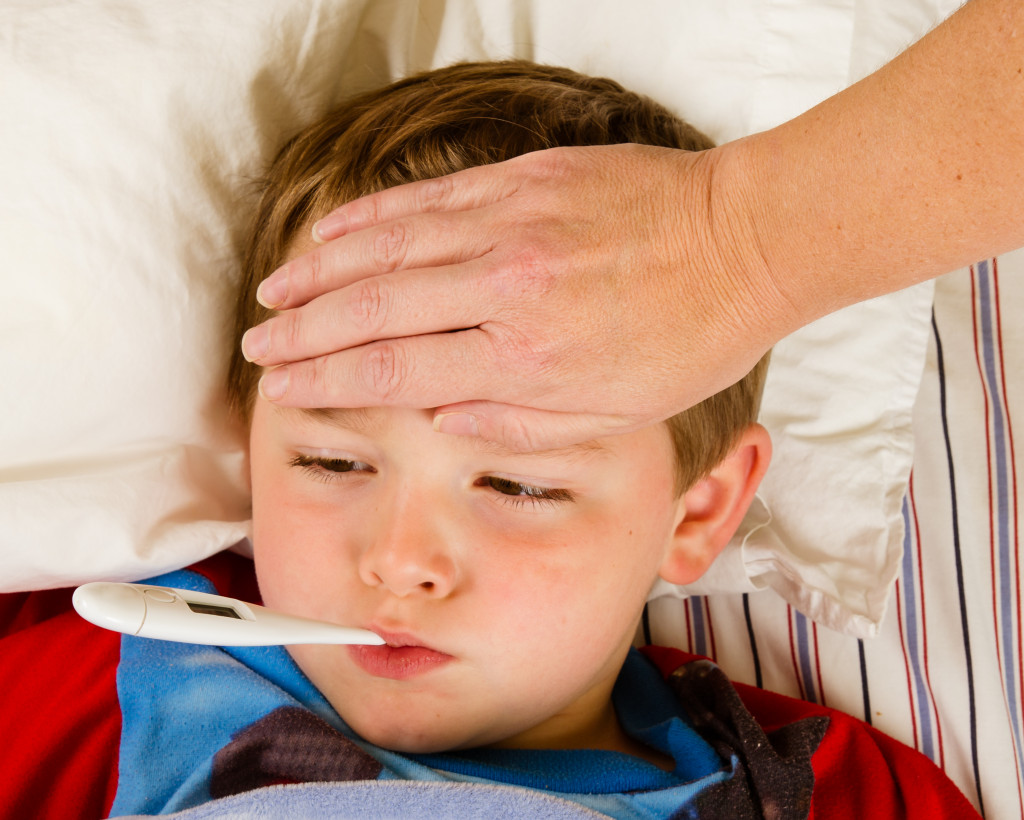• Fever is a sign of the body fighting off an infection or illness.
• Viral and bacterial infections are common causes of fevers in children.
• Reactions to vaccinations can also lead to a fever.
• A “fever of unknown origin” with no other symptoms may require medical attention.
• Cold weather can also be a factor in your child’s fever. Investing in a heater may help keep the house warm and prevent the fever from occurring.
Fever is a common symptom of many illnesses, including the flu and colds. It can also be caused by other conditions such as infections, certain medications, or even physical conditions such as heat exhaustion. It’s pretty standard for children to get a fever. Here’s what you need to know about fevers, why they happen, and how to deal with them.
Why do Fevers Happen
Contrary to popular belief, having a fever isn’t a bad thing. Instead, it’s a sign that the body is fighting off an infection or other illness. A fever occurs when the body’s temperature increases, activating the immune system and helping fight invading germs or infections. However, it can be problematic if your children are getting it often.
Reasons Why Your Children Are Getting Fever Often
If your children are getting fever more often than usual, it’s essential to find out why. While a fever is often the body’s way of fighting off an infection, other potential causes exist. Here are possible reasons for your child’s fever and what you can do about it.
Potential Cause #1: A Viral Infection
One of the most common reasons for fever is a viral infection. Viruses are tiny organisms that cause infections in the body. The symptoms of a viral infection can vary depending on the virus, but they often include a fever, cough, and runny nose. Many types of viruses can cause fevers in children, such as the flu or the common cold.
If your child has a viral infection, the best thing you can do is help them rest and stay hydrated. You can also give them acetaminophen or ibuprofen to help reduce their fever. However, it’s important not to give your child aspirin, as this can cause a severe condition called Reye syndrome. If your child’s fever lasts more than three days or develops other symptoms, such as a rash, it’s essential to see a doctor.

Potential Cause #2: A Bacterial Infection
While viruses are one of the most common causes of fevers, bacterial infections can also lead to a rise in body temperature. Bacterial infections are caused by harmful bacteria that invade the body and multiply. Some common examples of bacterial infections include strep throat and ear infections.
However, bacteria can also cause more severe conditions like meningitis or pneumonia.
Bacterial infections often require treatment with antibiotics prescribed by a doctor. If your child has a bacterial infection, you should immediately take them to their pediatrician. Bacterial infections can sometimes be life-threatening if they’re not treated promptly.
Potential Cause #3: Reaction to a Vaccination
Another potential reason for your child’s fever is a reaction to a vaccination. For example, it’s common for children to develop fevers after receiving certain vaccinations, such as the MMR (mumps-measles-rubella) vaccine or the DTaP (diphtheria-tetanus-acellular pertussis) vaccine. Usually, these fevers are mild and resolve independently within two days.
If your child develops a fever after being vaccinated, it’s essential to monitor them closely and contact your pediatrician if their temperature exceeds 102 degrees Fahrenheit or if they seem unwell in any other way.
Potential Cause #4: A Fever of Unknown Origin
Sometimes, children will develop fevers for no apparent reason—this is known as a “fever of unknown origin.” If your child has had a fever for more than two weeks with no other symptoms present, it’s essential to see their pediatrician so that they can rule out any underlying medical conditions. For example, autoimmune disorders like lupus or juvenile idiopathic arthritis may cause some fevers of unknown origin.

Potential Cause #5: Cold Weather
The cold weather can be a factor in your child’s fever. When the weather is cold, your body’s natural response is to raise its temperature for warmth. Unfortunately, this can lead to a low-grade fever in some cases, especially if your child spends too much time outdoors or isn’t dressed warmly enough.
If you think the cold may be causing your child’s fever, then it might be good to invest in a heater. An affordable wood-burning stove keeps the house warm and toasty during wintertime. It’s also much cheaper than investing in electric heaters.
Fever is a common symptom of many illnesses, and it can be worrying if your child is getting one often. Knowing the potential causes will help you to identify the underlying cause and take appropriate action. If your child has a fever lasting more than three days or develops other symptoms, seeking medical attention immediately is essential.



















